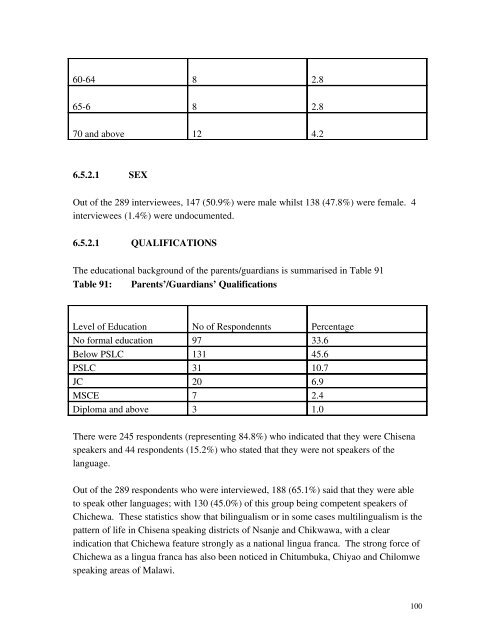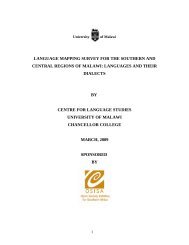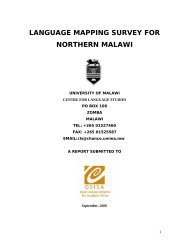SOCIOLOLINGUISTIC SURVEYS - Centre for Language Studies
SOCIOLOLINGUISTIC SURVEYS - Centre for Language Studies
SOCIOLOLINGUISTIC SURVEYS - Centre for Language Studies
You also want an ePaper? Increase the reach of your titles
YUMPU automatically turns print PDFs into web optimized ePapers that Google loves.
6064 8 2.8<br />
656 8 2.8<br />
70 and above 12 4.2<br />
6.5.2.1 SEX<br />
Out of the 289 interviewees, 147 (50.9%) were male whilst 138 (47.8%) were female. 4<br />
interviewees (1.4%) were undocumented.<br />
6.5.2.1 QUALIFICATIONS<br />
The educational background of the parents/guardians is summarised in Table 91<br />
Table 91: Parents’/Guardians’ Qualifications<br />
Level of Education No of Respondennts Percentage<br />
No <strong>for</strong>mal education 97 33.6<br />
Below PSLC 131 45.6<br />
PSLC 31 10.7<br />
JC 20 6.9<br />
MSCE 7 2.4<br />
Diploma and above 3 1.0<br />
There were 245 respondents (representing 84.8%) who indicated that they were Chisena<br />
speakers and 44 respondents (15.2%) who stated that they were not speakers of the<br />
language.<br />
Out of the 289 respondents who were interviewed, 188 (65.1%) said that they were able<br />
to speak other languages; with 130 (45.0%) of this group being competent speakers of<br />
Chichewa. These statistics show that bilingualism or in some cases multilingualism is the<br />
pattern of life in Chisena speaking districts of Nsanje and Chikwawa, with a clear<br />
indication that Chichewa feature strongly as a national lingua franca. The strong <strong>for</strong>ce of<br />
Chichewa as a lingua franca has also been noticed in Chitumbuka, Chiyao and Chilomwe<br />
speaking areas of Malawi.<br />
100





